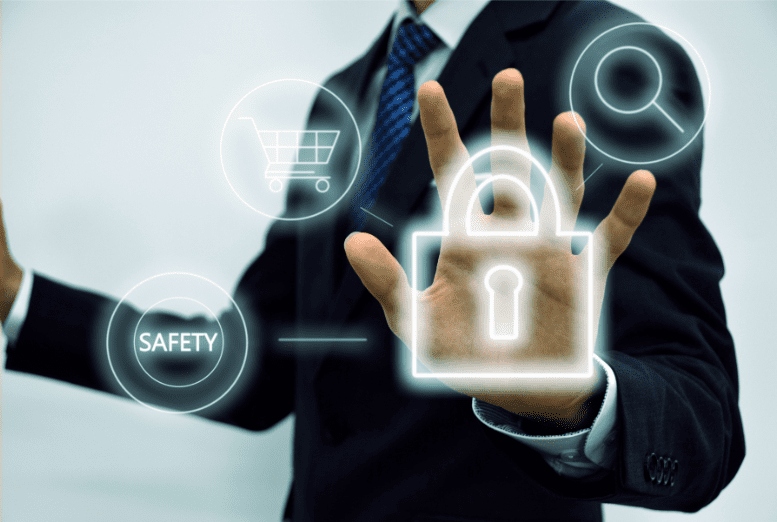Fortifying Your Brand’s Digital Fortress: The Crucial Role of Cybersecurity in Online Brand Protection
In today’s hyper-connected digital landscape, where the boundaries between physical and virtual worlds are blurred, safeguarding your brand extends far beyond traditional methods of brand management. Cybersecurity has become a linchpin in the complex web of brand protection, serving as the armor against the ever-present threats of data breaches, hacking, and cyberattacks. This article delves into the importance of cybersecurity in preserving your brand’s integrity and offers best practices to ensure robust online brand protection.

Importance of Cybersecurity in Protecting Your Brand
Safeguarding Customer Data and Trust
The cornerstone of any successful brand is the trust it establishes with its customers. Online brand protection is intrinsically linked to the responsible handling and safeguarding of customer data. Here’s why cybersecurity is crucial in this context:
- Privacy Preservation: Implementing robust cybersecurity measures ensures that sensitive customer information, such as payment details and personal data, remains private. Trust is fragile, and a breach of this trust can irreparably damage your brand’s reputation.
- Legal Compliance: Many jurisdictions have stringent data protection regulations, such as the General Data Protection Regulation (GDPR) in Europe. Failing to protect customer data can result in severe legal consequences and financial penalties, further tarnishing your brand’s image.
The trust between a brand and its customers is the bedrock upon which successful businesses are built. It’s not just about delivering quality products or services; it’s also about safeguarding the privacy and security of customer data. In this digital age, where data is often the currency of the internet, establishing and maintaining trust through robust cybersecurity measures is paramount. Let’s explore this crucial aspect in more depth.
- Privacy Preservation:a. Data Breach Fallout: Cybersecurity is the virtual moat protecting the castle of your brand. It ensures that sensitive customer information, such as payment details, personal data, and communication history, remains private. In the event of a data breach, this moat becomes a vital defensive barrier. Without it, your brand’s integrity is compromised, potentially causing a catastrophic loss of customer trust.
b. Trust Erosion: Trust, once damaged, can be incredibly challenging to rebuild. Customers expect their data to be handled with utmost care, and a breach can lead to feelings of betrayal. When customers lose faith in a brand’s ability to protect their data, they often seek alternatives, resulting in lost revenue and a tarnished reputation.
c. Brand Reputation: The fallout from a data breach can extend far beyond the immediate financial losses. The negative publicity, damage to brand reputation, and long-term loss of customer trust can haunt a company for years. News of a breach spreads rapidly in the digital age, making it essential to prevent such incidents in the first place.
- Legal Compliance:a. Stringent Data Protection Regulations: Many regions, including Europe with the General Data Protection Regulation (GDPR), have enacted strict data protection laws. These regulations place the onus squarely on businesses to protect customer data adequately. Failure to comply with these laws can result in substantial legal consequences, including hefty fines and legal actions.
b. Global Reach of Regulations: It’s crucial to note that data protection regulations often have a global reach. Even if your business is not physically located in a region with such laws, if you collect data from individuals in those areas, you may still be subject to their regulations. Ignorance is not a valid defense, making it imperative to proactively secure customer data.
c. Brand Image and Legal Ramifications: A brand’s image and legal standing are closely intertwined. A brand that flouts data protection laws not only faces financial penalties but also further tarnishes its image in the eyes of the public. Being seen as negligent or indifferent to customer data security can be a public relations disaster.
Cybersecurity is not merely a technical aspect of modern business; it is the guardian of customer trust and brand reputation. Protecting customer data is not just a matter of avoiding financial losses; it is about upholding your brand’s integrity and complying with the legal and ethical obligations of the digital age. As cyber threats continue to evolve, investing in cybersecurity is an investment in the longevity and success of your brand. It is, quite literally, the shield that defends your brand in the virtual battlefield of the internet.

Protecting Against Hacking and Data Breaches
Cyberattacks loom as constant threats, regardless of your brand’s size or industry. Cybercriminals are relentless in their pursuit of vulnerabilities to exploit. Prioritizing cybersecurity within your online brand protection strategy is essential for the following reasons:
- Minimizing Brand Damage: Hacking attempts and data breaches can inflict substantial damage on your brand’s reputation. When customers’ data is compromised, trust is eroded, and recovery can be a long and costly process.
- Financial Implications: Data breaches often result in financial losses, including compensation to affected parties, legal fees, and fines. Cybersecurity investments are a fraction of the cost compared to the financial repercussions of a breach.
- Best Practices for Ensuring Cybersecurity
To fortify your online brand protection strategy, consider these best practices for ensuring robust cybersecurity:
Implement Strong Security Measures
- Advanced Encryption: Deploy state-of-the-art encryption technologies to protect sensitive data both at rest and in transit. Encryption renders data unreadable to unauthorized parties, even if they gain access to it.
- Multi-Factor Authentication (MFA): MFA adds an additional layer of security by requiring users to provide multiple forms of verification before accessing accounts or systems. This significantly reduces the risk of unauthorized access.
- Firewalls and Intrusion Detection Systems (IDS): Implement firewalls and IDS to monitor network traffic and identify potential threats. These defenses act as barriers against cyberattacks and suspicious activities.
Regular Security Audits and Updates
- Ongoing Assessments: Cyber criminals continually evolve their tactics, making it vital to conduct regular security audits to identify vulnerabilities in your systems and processes.
- Timely Updates: Ensure that all software, applications, and systems are updated promptly with the latest security patches. Cybersecurity is a race against time, and staying up-to-date is paramount.
In the fast-paced digital realm, the specter of cyberattacks looms perpetually, casting a long shadow over businesses regardless of their size or industry. Cybercriminals, driven by their relentless pursuit of vulnerabilities to exploit, pose a persistent threat to brands worldwide. Prioritizing cybersecurity as an integral component of your online brand protection strategy is paramount, and it’s rooted in several compelling reasons.
- Minimizing Brand Damage:a. Reputation at Stake: When cyberattacks succeed and data breaches occur, they can inflict substantial damage on your brand’s reputation. Customer trust, once eroded, is challenging to rebuild. Consumers expect their data to be safeguarded diligently, and a breach can shatter their faith in your brand.
b. Costly Recovery: The aftermath of a data breach is a daunting landscape to navigate. Beyond the immediate financial losses, the road to recovery can be long and costly. Rebuilding customer trust and brand image may require substantial investments in marketing and public relations efforts.
c. Lost Competitive Edge: In an era where trust and security are paramount, a brand tainted by a data breach may lose its competitive edge. Potential customers may gravitate toward competitors perceived as more secure, leading to decreased market share.
- Financial Implications:a. Monetary Losses: Data breaches often translate into significant financial losses. These losses can encompass compensation to affected parties, regulatory fines, legal fees, and expenses associated with investigating and rectifying the breach.
b. Regulatory Penalties: Numerous data protection regulations mandate severe penalties for non-compliance. These penalties can run into the millions, significantly impacting a company’s bottom line. Prioritizing cybersecurity investments is a fraction of the cost compared to the potential financial repercussions of a breach.
c. Hidden Costs: Beyond the obvious financial consequences, data breaches can impose hidden costs, such as increased insurance premiums, diminished stock value, and the potential loss of business partnerships.
Best Practices for Ensuring Cybersecurity
To fortify your online brand protection strategy, it’s crucial to adopt best practices for ensuring robust cybersecurity. These practices not only mitigate the risk of data breaches and hacking attempts but also bolster your brand’s resilience in the face of cyber threats.
- Implement Strong Security Measures:a. Advanced Encryption: Deploy state-of-the-art encryption technologies to protect sensitive data both at rest and in transit. Encryption ensures that even if unauthorized parties gain access to data, it remains unreadable, preserving its confidentiality.
b. Multi-Factor Authentication (MFA): Integrate MFA to add an additional layer of security. This technology requires users to provide multiple forms of verification before accessing accounts or systems, significantly reducing the risk of unauthorized access.
c. Firewalls and Intrusion Detection Systems (IDS): Implement firewalls and IDS to monitor network traffic and identify potential threats. These defenses act as vigilant barriers against cyberattacks and suspicious activities.
- Regular Security Audits and Updates:a. Ongoing Assessments: The tactics of cybercriminals are in constant flux, underscoring the importance of conducting regular security audits. These assessments help identify vulnerabilities in your systems and processes, allowing for timely remediation.
b. Timely Updates: Ensure that all software, applications, and systems are updated promptly with the latest security patches. Cybersecurity is a race against time, and staying up-to-date is paramount to staying ahead of emerging threats.
Cybersecurity is not merely a safeguard; it’s an imperative pillar of modern business strategy. Protecting against hacking and data breaches is not just a matter of preserving your brand’s financial health but also its reputation and customer trust. By adopting strong security measures, conducting regular security audits, and staying current with updates, your brand can fortify its defenses against the ever-evolving landscape of cyber threats. In this digital age, cybersecurity isn’t optional; it’s the linchpin of brand resilience in the face of relentless cyber adversaries.
In the digital age, online brand protection is an intricate tapestry that includes elements of cybersecurity woven into its fabric. Prioritizing cybersecurity is not only a defensive strategy but also a proactive approach to safeguarding your brand’s reputation and customer trust. By implementing strong security measures, conducting regular security audits, and staying vigilant with updates, your brand can establish an impenetrable digital fortress, resilient against the ever-evolving threats of the cyber world. Remember, in the world of online brand protection, prevention is the best cure, and cybersecurity is the antidote to potential digital ailments.
